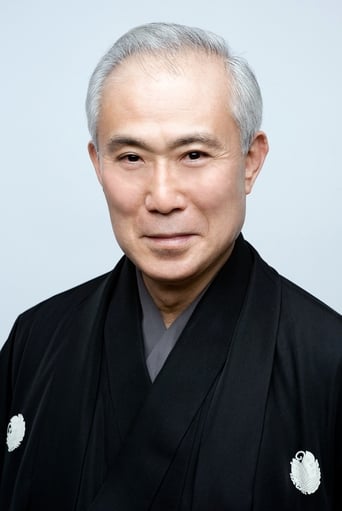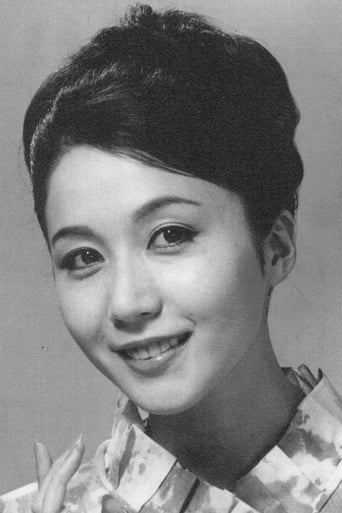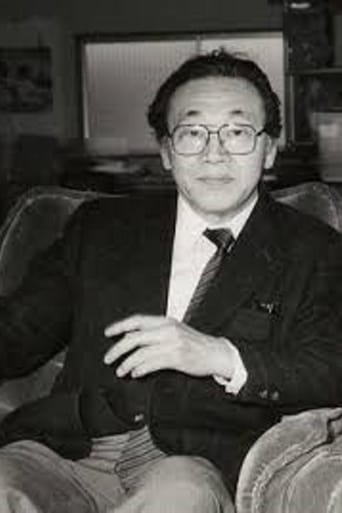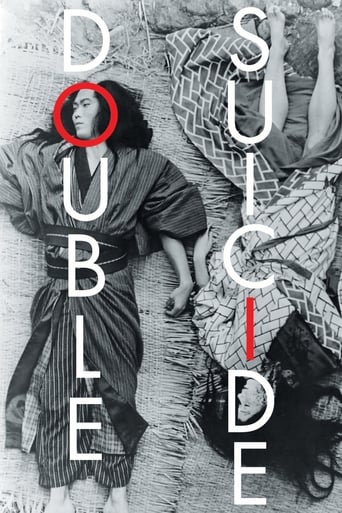
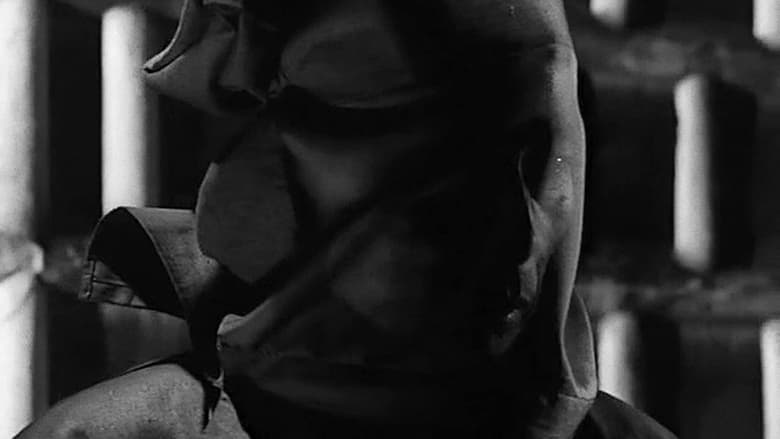
Double Suicide (1969)
Successful and married with children, paper-mill owner Jihei knows better than to contradict the strict social and moral codes of 18th-century Japan. But when he meets the lovely courtesan Koharu, he becomes a man obsessed. Koharu returns his love, even foregoing other customers while Jihei schemes to somehow buy her freedom. His efforts yield ruinous consequences for his business and his family life, and Koharu is meanwhile purchased by another client.
Watch Trailer
Cast


Reviews
Wonderful Movie
Waste of time
Sadly Over-hyped
Instead, you get a movie that's enjoyable enough, but leaves you feeling like it could have been much, much more.
Viewed on DVD. Restoration = five (5) stars; subtitles = four (4) stars. Director Masahiro Shinoda's inventive and dramatic use of a layered presentation technique where a play about making a movie is the movie, sort of. It is a tale of a philandering husband confronting a mid life crisis during Japan's feudal age (a mashup of the usual Shomin-Geki (house drama) and Jidai-Geki (period drama) photo play genres) culminating in the "traditional" lovers' joint murder/suicide . The clever use of helpful and ever-present "stage hands" dressed top-to-toe in black (like those who move things about in the dark between scenes of a stage play) is both menacing and fascinating (they even turn up in the on-location exterior death scenes). Puppets appear in the opening scenes without explanation and then are gone forever without explanation (there is derivative reason for this, but it is missing from the movie). An abstract Torii (a Shinto shrine archway) is used for assisted suicide (or is it willful execution?) with the help of many stage hands (the Director seems to be editorializing here). At about mid point, the movie turns seriously boring from the cumulative impact of nonstop, over-the-top acting histrionics, script repetitions, and scenes of talking heads (the film has been overly stretched and could be cut roughly in half). Cinematography (narrow screen, black and white) is okay (this antiquated format seems to have been used to appeal to art-house theater patrons of the day). Restoration is fine. Score is close to being acoustically invisible. Subtitles are all but missing from the opening credits. They also need some judicious re-editing given the screen flash rate and their accuracy (hey, it's not easy to find translators with Kansai-Ben skills who will work cheap!). Mostly a case of art for art's sake. WILLIAM FLANIGAN, PhD.
"Double Suicide" is a film that reminds me strongly of "Yûkoku"--a film that came out three years earlier. Both are about a couple tragically fated to commit suicide together and both go beyond the fourth wall--at times showing that it is all really just a play with actors. And, both were strongly appreciated and embraced by Japanese audiences--something that is particular to this society. I really don't think a movie where the audience knows the couple who are the main characters will have to die by the end would create a lot of ticket sales in the West--especially when this is known by the audience before the film even begins. There is a beauty in suicide that is strictly Japanese--making these sort of films difficult to fully appreciate and understand."Double Suicide" begins with the fourth wall--actors readying for the movie, producers and directors discussing the locations, etc.. This is a highly unusual move and was done because this film apparently was originally a play--with a rather familiar theme for Japan. So instead of trying to hide this, the beginning pays homage to it and the film shows its stage roots various times throughout the story.The story involves a poor man (Jihei) falling for a prostitute (Koharu). His goal is to buy her contract and free her, but he just just can't manage it because his business is not doing very well. So, for most of the film Koharu broods--making her a very unsuccessful prostitute since no one wants to sleep with a woman who constantly talks about killing herself. As for Jihei, he broods as well and interrupts any potential clients from having sex with Koharu--as he's jealous. However, this cannot go one forever and you know that by the end of the picture both of the lovers will have given up on the idea of marriage and they will be dead.So is this any good? Well, since it won so many Japanese awards, the answer is an emphatic YES...provided you are Japanese. However, for other audiences it is far less satisfying--though you must admit that the film is well-constructed and very stylish. I see that Criterion has produced this DVD, so there must be some audience outside of Japan for it (after all, I am watching it and the few other reviews for the movie are all quite positive)...but it will definitely be a niche audience and I can't see this appealing to the average viewer. Not bad....just not particularly enjoyable due to there being little suspense about the ending (after all, it's "Double Suicide") and the film seems to drag in between. After having watched several hundred other Japanese movies, I just can't see this one as being among the best the country has to offer.
I had never heard of Shinoda or Double Suicide prior to enrolling in a Japanese literature and film class in college. The memory of watching it, though, remains with me. As I did when I first saw Chinatown or Greed or 2001, I sat there like a codfish, mouth open and catching flies. I had never seen anything like it, and I have not seen anything like it since. The film is based on Chikamatsu's 18th-century bunraku play (a type of play that uses puppets and leaves the cloaked puppet masters in plain view of the audience) and offers a wonderful translation of that text and that style of theatre. That's correct, cloaked puppetmasters move about on screen along with the characters. This element and this element alone could have caused my love of this film to grow. It's a simple choice, really, but creates such depth to the story. In the traditional play, the puppetmasters were there because they had to be. In the film they become fate, guiding the actors through the world. It's a wonderful touch and an interesting concept. The photography of the film is incredible as well, though; the stark black and white melding beautifully to the basic, raw emotions of the characters and the harsh view of love put forth by the film. The set design is mindblowing as well, with its over-sized woodblock prints of that era. The film has a visceral impact on its audience, but it does so without overly manipulating one's emotions. If anything, the audience is kept at a distance from the characters and is therefore unable to feel anything sentimental for them. However, the film's bleakness is effective and affective, giving one the feeling, at the end, of having been punched in the guts. Granted, such a feeling is not for everyone, but I appreciate films that can affect me in such ways.
Not a perfect film, but fascinating. Anyone interested in truly original cinema should see it for the elements of bunraku (Japanese puppetry)used in the film.


